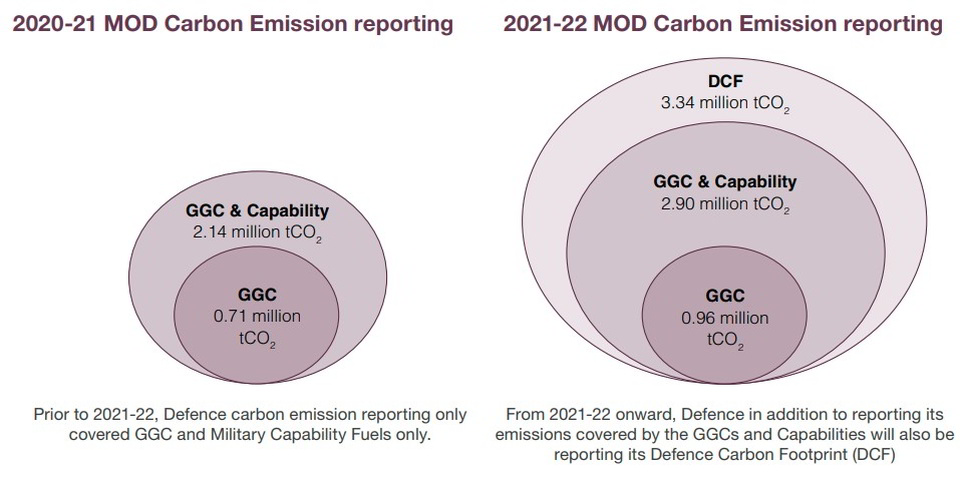
The UK House of Commons Defence Committee has released the Defence and Climate Change report, following their inquiry launched in May 2022. The report found that the UK MoD can ‘do much more to measure and reduce its carbon emissions, without eroding military capacity’.
Linsey Cottrell provides a brief summary of the report findings and welcomes the recommendations calling for more demanding targets, better emissions reporting and greater transparency.
More than just about climate threats and adaptation?
In January 2023, CEOBS and Scientists from Global Responsibility presented oral evidence to the UK Defence Committee inquiry on Defence and Climate Change. The Defence Committee’s report consolidates inquiry evidence and includes recommendations to the UK government. The report reflects our call for greater transparency and action around climate mitigation. This includes recommendations for setting demanding reduction targets, and the need for improved reporting of military emissions. It is important these recommendations are not lost, given that the main emphasis of the report is on climatic threats to global security and defence, and the specific implications and defence climate adaptation needs in polar regions.
On the international agenda, the report notes the role that the UK MoD could play in influencing accelerated carbon reduction across other organisations and armed forces. Importantly, this includes how the MoD and other UK government partners could encourage the United Nations Framework Convention on Climate Change (UNFCCC) and the Intergovernmental Panel on Climate Change to update the reporting framework for military emissions.
We also encourage UK support for driving improvement in reporting obligations to the UNFCCC. At present, reporting disaggregated data to the UNFCCC on military fuel is voluntary and datasets on military emissions are poor, which means there is an equally poor understanding of the global contribution of the military to climate change. It is estimated that militaries are responsible for around 5.5% of global GHG emissions, it is therefore critical that military GHG reduction plans are in place, actioned and monitored through international bodies such as the UNFCCC.
The report also calls for greater transparency across NATO, which we also support. Indeed, NATO did publish it’s GHG emissions tracking methodology in July, but the framework is limited and explicitly excludes emissions from NATO-led operations and missions, and other activities such as training and exercises.
The report also highlights the opportunity for the military to exploit low-carbon technologies, such as solar, and electric-driven or hybrid vehicles. However, the technologies listed include modular nuclear reactors for deployments and for overseas bases, yet there is no mention of the major security and environmental risk from installing nuclear reactors at potential military targets. This is a considerable oversight, especially given Russia’s war in Ukraine and the attacks on nuclear infrastructure.
Improvements needed across UK MoD
There are a number of recommendations that set out the need for improvements across the UK MoD in terms of GHG emission reductions. Critically, the report highlights that the Greening Government Commitments (GGC) set for the UK MoD are ‘insufficiently demanding’, and require revision since the current targets can be met by relying on decarbonisation of the National Grid alone. In particular, we welcome the report’s recommendations for:
- More demanding GGC targets for the UK MOD;
- MoD top-level budget holders to separately report their emissions, with emission reduction targets ideally set over 5 year periods. The RAF has set an ambitious target to reach net-zero by 2040, but there are no consistent milestones or targets across other UK commands;
- Appointment of a dedicated MoD climate change director;
- Adoption of Science Based Targets initiatives (SBTi) for the MOD and its major suppliers;
- Development of carbon reduction plans for the MoD’s major suppliers;
- Independent verification of military emissions reporting;
- A return to more in-depth standalone annual reviews of its climate and sustainability performance; and
- Commissioning of work to better understand total defence carbon emissions, including apparent discrepancies in earlier reported figures.

The UK MOD expanded its carbon emissions reporting for 2021-2022 and added some Scope 3 emissions, but this still excludes the whole carbon footprint of the military which is estimated at around 13 million tonnes of CO2e. The Defence Committee report recommends the improved understanding of carbon emissions and setting of reduction targets (Source: MOD Annual Report and Accounts 2021–22 p.59)
Missed opportunities
There are missed opportunities for further recommendations in the report. This includes a consideration of changes in overseas deployment or military security strategy to reduce emissions. Unfortunately, the Defence Committee report does not include any recommendation to develop a methodology for assessing other military GHG emissions that relate more specifically to warfighting activities such as fires, damage to infrastructure or post-conflict reconstruction needs. We call these Scope 3 Plus emissions and have proposed a reporting framework that includes categories linked to a conflict itself. The report does however acknowledge and include Scope 3 Plus emissions under the GHG emission definitions given in Annex 4 of the report.
Although the report addresses the need for preparedness and environmental training for military personnel to adapt to changing climatic conditions, there is no reference to the need for sufficient training and resources on climate literacy, or platforms for encouraging ideas or engagement from personnel on mitigation opportunities or prioritisation.
We await the UK government’s response to the report – which is normally within two months – and how or whether the recommendations presented are taken forward.
Linsey Cottrell is the Environmental Policy Officer at CEOBS. Our thanks to Stuart Parkinson from SGR who also contributed comments on the Defence Committee report. To learn more, join the inaugural conference on Military and Conflict GHG emissions to be held on 26th September 2023 at the University of Oxford and online. Conference details here.





